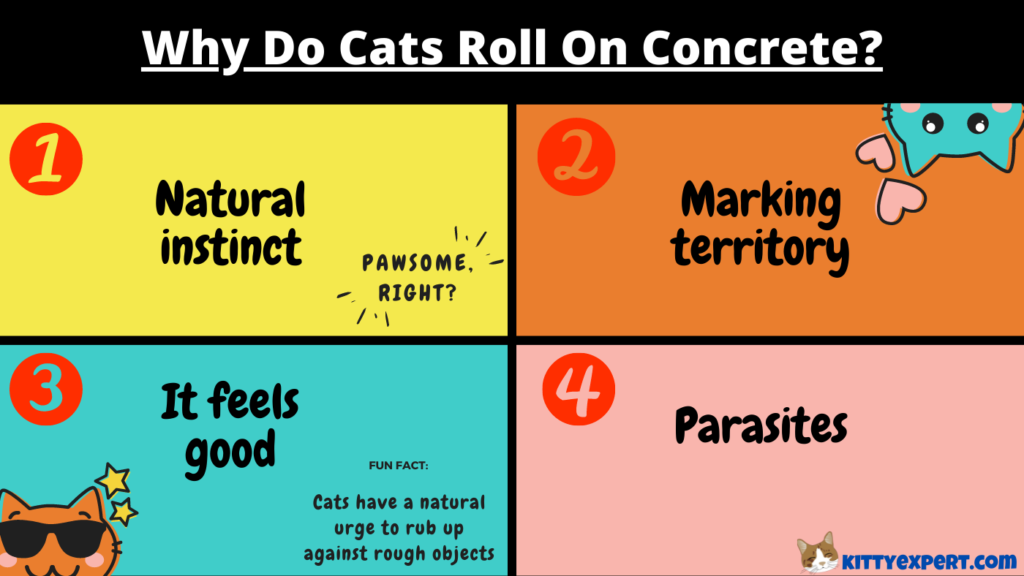Cats have many strange behaviors. One of the strangest is when they roll on concrete or other hard surfaces. In this article, I will cover all reasons why cats roll on concrete, and where this behavior originated.
Why Do Cats Roll On Concrete?
Cats roll on concrete due to natural instinct, marking territory, sensation, parasites, and attraction to a scent.
Below I will go into detail for each of these reasons.
Natural instinct
One explanation for this behavior can be found by looking at feline history. During ancient times, wild cats would use certain rocks in order to sharpen their claws before going out to hunt prey such as mice and gazelle.
Since these natural surfaces were not always readily available within a cat’s home range (it took time and effort for it find), felines instead learnt how to use hard floors of different materials in order to remove old sheaths from their sharpened claws. Cats do this to prevent their claw from growing into their pad.
While rubbing their claws along the concrete, a cat can also be compelled to rub their whole body along it.
Marking territory
If you have a multi-pet household, or other animals frequent your yard, your cat might be rolling on concrete to mark his/her territory. Cats like to mark their territory because they are naturally territorial animals.
When cat’s roll around on a surface, they release their pheromone glands which leaves behind their distinct scent. This scent tells other animals that your cat has laid claim to this area.
It feels good
Simply put, your cat might roll around on concrete because it feels good. The hard surface of cement can provide a nice scratching sensation for your cat. Additionally, your cat might be rolling around on the cement to get rid of an unwanted coat.
The concrete can help them remove loose fur. Getting rid of excess fur is one of many ways that cats groom themselves.
Additionally, cats will roll around on concrete in order to stretch out their arms and legs.
Parasites
Your cat might also be rolling around on cement because he/she is suffering from fleas or other parasites. Parasites can cause skin irritation which makes your cat very uncomfortable. Your cat will likely try to relieve the pain by excessively scratching the affected areas.
Your cat might roll around on the concrete in order to scratch certain areas of their body that they can’t reach with their paws.
If you suspect your cat has parasites, you should do a full body check of their skin. If you find any red areas of inflammation, you should contact a vet. You should know that if your cat continues to scratch themselves on the concrete, it could cause an infection on their skin.
You can temporarily use coconut oil to treat fleas on cats if you are not able to get to a vet for a couple days. If you have a kitten, it is important that you regularly give him/her a flea bath.
Attraction to a scent
If you own a cat, you are probably well aware of their strong sense of smell. In fact, they have over 200 million odor receptors in their nose, which is the reasons why a cat’s sense of smell is 14 times greater than a humans.
Your cat might be rolling around in the concrete because they are attracted to the smell of the concrete. It could be because another cat or pet recently rolled around in the same spot. As nasty as it sounds, it could also be a spot where an animal peed in the last couple of days.
Should I be worried if my cat is rolling around in concrete?
No, you should not be worried if your cat rolls around in concrete. It is a natural and very popular behavior among pet cats.
The only possible issue is that your cat might be suffering from parasites. If this is the case, you should do what I mentioned above and check your cat’s skin for any signs of inflammation. You can also check your cat’s stool to make sure there are no parasites inside of it.
If your cat does frequently roll around on concrete, make sure you keep a close eye on them when you are driving up and down your driveway.

